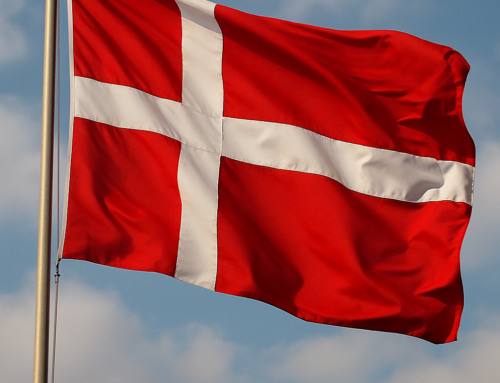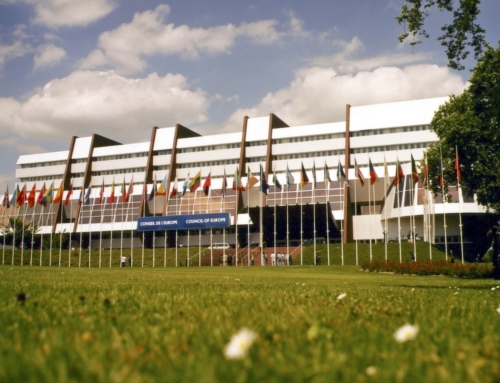Brussels, 3 March 2021
On 18 February 2021, Bénédicte Colin, FAFCE Project Manager, shared the work of FAFCE against pornography with the Italian association PURIdiCUORE, also dedicated to tackle the challenges of pornography. The association promotes the integrity in personal and affective relationships, the protection of the family and the happy and integral development of each person, free from pornography. The interview was conducted by Tebaldo Vinciguerra, Secretary of PURIdiCUORE.
Tebaldo Vinciguerra: What are your main activities and your usual contacts?
Our federation works on a double European level: the European Union in Brussels and the Council of Europe in Strasbourg. Our work consists in bringing the voices of our member associations to these two levels and in informing them about European current affairs on family issues. The activities of FAFCE can be summed up as the work of representating and promoting the family within the European institutions. In concrete terms, this means following the European legislative process and contributing to this process through the concrete experience of families. Finally, FAFCE also works to encourage the creation of family associations throughout Europe.
FAFCE’s topics are related to everything that concerns the family: fiscal justice, the balance between family and professional life, access to housing, demographic issues, the education of children, equal opportunities for men and women, pornography, the protection of life, integral ecology, the care of the elderly, sexual abuse of children, etc. Nevertheless, the core of our work is above all to emphasize the primary role of the family and the logical need to implement family policies, in coordination with family associations.
TV: Last December, you contributed to a public consultation of the European Commission on the issue of sexually abused children and dangerous and illegal content online. Can you summarize the content of your text, with particular emphasis on pornography?
FAFCE has drawn the attention of the European Commission to 5 concrete points of action to fight against child sexual abuse :
- The fight against the production and distribution of child pornography begins with the application of existing European legislation, with increased means allocated to the detection and suppression of such content, and the legal proceedings that follow;
- The hyper-sexualization of children in all media encourages paedophile acts: it must be recognized and legally prohibited;
- The production of sexual content (“sexting”) by children themselves increases their vulnerability to sexual abuse and must be prevented by protective laws and preventive work among children and parents, with the help of family associations;
- Children’s access to online pornography is a form of sexual violence and constitutes a serious public health problem: such access by minors is illegal and age verification must be strictly enforced;
- Parents must be supported, informed and recognized in their role and responsibility to educate and protect their children.
TV: What is this particular European mechanism and what do you expect from it?
At the moment the EU must urgently respond to a problem posed by the ePrivacy Directive, effective since December 2020, which obliges communication service providers to respect the confidentiality of their users’ communications. This directive has the unintended effect of making it “illegal” to use automatic detection tools to identify child pornography content or solicitations!
To respond to this legal vacuum, the European Commission proposed in September 2020 a temporary derogation of this directive, so that providers can continue to detect, report and remove child pornography content online.
But the Commission wants to go further: it is planning new legislation on the fight against sexual abuse of children for July 2021, which will replace a 2011 directive that is rarely applied by European countries. With this new legislation, the Commission hopes to finally succeed in applying the requirements already included in the 2011 directive, and to move from a voluntary basis to a legal obligation for online service providers to detect, report to public authorities and remove child pornography content.
TV: Access of minors to online pornography, sexting and over-sexualization of children in the media: in what year did FAFCE start working on these issues?
FAFCE has been working on pornography issues since at least 2016, on the occasion of the preparation of the European directive on audiovisual media services. Our federation had particularly insisted on the need to protect children from sexual abuse and access to pornography. We also worked on the issues of addiction to pornography and its violation of women’s dignity. Since then, we have also addressed the issues of hypersexualization of children, “sexting” and the link between pornography and human trafficking.
TV: Would you say that these are issues of concern to your member associations? To your knowledge, do these associations or federations work or have they recently worked on these issues?
Our member associations work directly with families, and therefore have a direct insight into this problem, in front of which parents and couples often find themselves powerless. To cite just two examples, our associate member in Spain, Foro de la Familia, and our French member, the National Confederation of Catholic Family Associations, are actively working on the effects of the pornography industry, the dependency it generates and the impact it has on families.
TV: What about the European institutions? Are these themes particularly prevalent, perhaps themes on which there is a sensitivity that goes beyond political alignments? Do you feel the possibility and the will to considerably strengthen the protection of children online in the near future? Or for ideological or technological reasons, is there not much to expect?
There is real attention from the European institutions on these issues, although they do not always grasp the extreme extent of this phenomenon. There is a certain political consensus on the rejection of pornography in its clearest abuses (trafficking in human beings, rape and violence against women, “revenge porn”, child pornography, sexual stereotypes). Nevertheless, the difficulties begin when one begins to talk about the problem of pornography not in its excesses, but in its very nature. There is no political will to recognize pornography as a public health problem. Pornography is defended by the idea of freedom of expression or the expression of one’s sexuality.
The new European directive is good news for the protection of minors on the Internet. The European Union is committed to finding technological solutions to ensure the effective protection of children. Nevertheless the European level only makes sense if national governments will apply this directive. This was already the case in 2011 when the European directive remained a dead letter for 23 Member States. It is therefore necessary to have a courageous and firm discourse at the European level that is followed at the national level.
TV: Is there any final consideration you would like to address to our readers (journalists and experts in various fields, priests and spiritual companions, parents)?
A final message should be that of hope. In the face of such a distressing reality as pornography and child pornography, it would be easy to despair. However, every day we meet committed people, experts in the technological, psychological or even medical field – our member associations too – who are doing a great job.
Let us not forget the richness of the Church’s teaching. The fight against pornography also begins with a fundamental work on human nature and on our relationship with creation. This cannot be better addressed than by the Theology of the Body, which is the foundation of a healthy relationship with sexuality from childhood to adulthood.
Article translated from the original version in Italian, published on the PURIdiCUORE Website: “Intervista con la FAFCE: la visione e l’impegno della Federazione delle associazioni di famiglie cattoliche in Europa“, 26 February 2021.
Interview also available in French.







